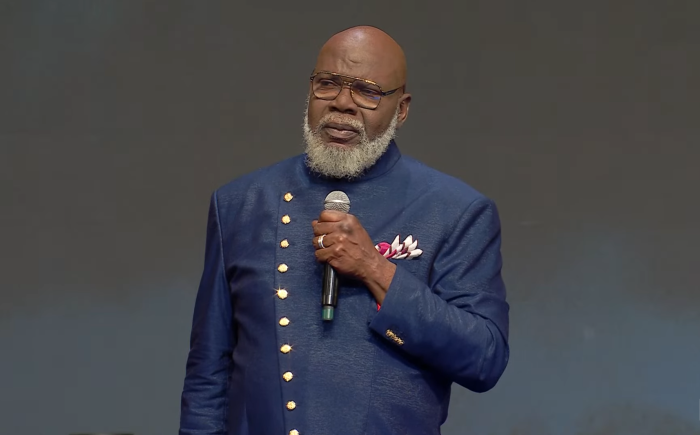
Former-pastor-turned-registered sex offender Duane Youngblood has refiled a motion to dismiss a defamation lawsuit filed against him and 10 other unidentified individuals by Bishop T.D. Jakes, for alleging Jakes sexually assaulted him when he was a teenager some 40 years ago.
The latest motion filed Monday in the U.S. District Court for the Western District of Pennsylvania and reviewed by The Christian Post seeks to dismiss Jakes’ lawsuit with prejudice pursuant to Federal Rule of Civil Procedure 12(b)(6). Jakes’ defamation lawsuit will be permanently dismissed if this motion is granted.
“This is defendant Duane Youngblood’s first motion to dismiss according to Federal Rule of Civil Procedure 12(b)(6). To date, the court has not ruled on the sufficiency of plaintiff’s defamation or conspiracy claims under Rule 12. As such, this motion addresses for the first time the legal plausibility of the complaint as pled,” Youngblood’s attorney, Tyrone Blackburn, wrote in the 20-page filing.

Youngblood’s latest legal pushback follows a recent denial of an earlier motion to dismiss Jakes’ lawsuit by U.S. District Judge William S. Stickman IV, pursuant to Pennsylvania’s Anti-SLAPP statute.
That statute allows, among other things, a defendant in a defamation lawsuit to file an early motion to dismiss the case on the grounds that the defamation claim is frivolous.
Stickman, in an opinion and order last month, said the arguments raised in Youngblood’s initial motion to dismiss Jakes’ lawsuit did not apply to his case and suggested his motion to dismiss would have been more applicable under Federal Rules of Civil ProcedureRule 12(b)(6), which allows a defendant to move to dismiss a complaint if it doesn’t allege enough facts to support a plausible legal claim.
“The Court will dismiss Youngblood’s motion because it relies on statutory provisions that are not applicable in this litigation. The Court will not reframe Youngblood’s argument to fit within the Rule 12 (b)(6) or Rule 56 framework. If Youngblood wishes to file a motion to dismiss based on Rule 12(b)(6) or Rule 56, he may do so provided that his filing complies with all applicable Federal Rules of Civil Procedure,” Stickman wrote.
Blackburn previously told CP that he would refile his motion to dismiss Jakes’ lawsuit as recommended by Stickman. He followed through on Monday.
“The severe constitutional limitations placed on public figure defamation suits — particularly the requirement of actual malice proven by clear and convincing evidence — exist to prevent litigation from chilling public discourse. … These limits, combined with Plaintiff’s failure to state a prima facie claim under § 8343(a), compel dismissal here,” Blackburn wrote in the conclusion of his filing, in which he cites Stickman’s own concern about the deficiencies in Jakes’ lawsuit.
“Moreover, the court independently noted the deficiencies raised in this Rule 12(b)(6) motion in its April 25, 2025, Memorandum Opinion. The court observed the complaint’s failure to allege specific defamatory statements, overuse of conclusory assertions, and lack of factual content supporting falsity and malice,” he argued.
“Those same defects, now formally presented under Rule 12, confirm that the complaint cannot survive. Furthermore, this motion does not suggest the court has already determined the substantive insufficiency of plaintiff’s claims. Instead, defendant respectfully submits that the complaint, as currently pled, fails to satisfy the governing federal pleading standards and, therefore, warrants dismissal under Rule 12(b)(6).”
Jakes, 67, who founded The Potter’s House megachurch in Dallas, Texas, nearly 30 years ago, filed his defamation lawsuit against Youngblood, 58, last November, a day after suffering a heart attack while preaching.
Youngblood claimed in interviews with internet personality Larry Reid on his “Larry Reid Live” show on Oct. 28 and Nov. 3, 2024, that Jakes assaulted him when he was about 18 or 19 years old. Jakes claims Youngblood engaged in “libel per se” and a civil conspiracy to commit defamatory acts.
“The underlying story in this case depicts a carefully planned effort by a convicted criminal, and those acting in concert with him, to rewrite history in order to deflect blame and accountability for his own reprehensible and criminal conduct and to publicly smear a renowned and eminently respected religious leader in a blatant and explicit attempt to extort him for millions of dollars,” lawyers for Jakes wrote in his 20-page lawsuit in which they detailed Youngblood’s history of abusing minors since at least 2002.
In his earlier 167-page motion to dismiss Jakes’ defamation lawsuit filed in January, Youngblood included multiple affidavits supporting his sexual assault claim against Jakes, including one from his older brother, Pastor Richard Edwin Youngblood, who alleges that Jakes attempted to sexually assault him, too.
In his opinion, Stickman noted that Youngblood’s previous motion to dismiss was based entirely on the Uniform Public Expression Protection Act and there was no mention of Rule 12(b)(6).
“In his motion and supporting brief, Youngblood does not mention Rule 12(b)(6) — the governing rule at this stage of litigation. (Id.). Moreover, Youngblood’s motion is reliant on the summary judgement like standard of §§ 8340.15 and 8340.16. The Court will not reframe Youngblood’s motion as a Rule 12 (b)(6) motion,” Stickman wrote.
“Youngblood relies on sworn affidavits to allegedly corroborate his statements and support his arguments. … The Court may not consider documents outside the pleadings under Rule 12(b)(6) (subject to certain exceptions which are not applicable here),” he added.
Contact: leonardo.blair@christianpost.com Follow Leonardo Blair on Twitter: @leoblair Follow Leonardo Blair on Facebook: LeoBlairChristianPost

















